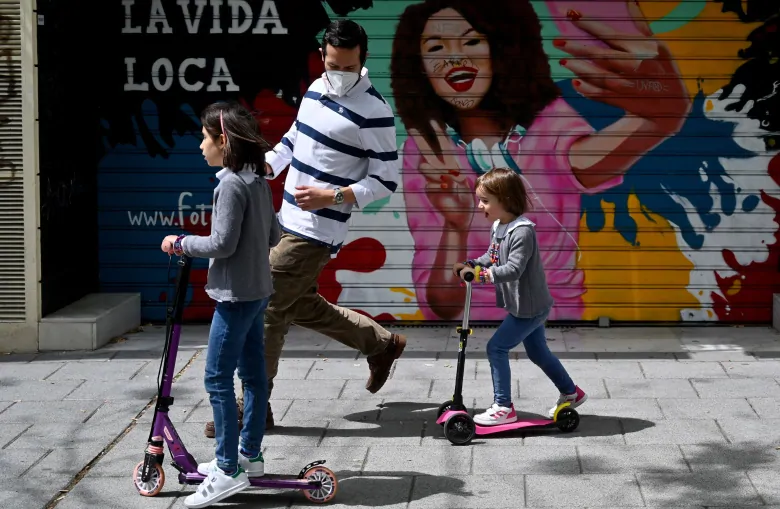Ontario is set to unveil its reopening plan this afternoon, a day after it announced that publicly funded schools in the province will remain closed until at least May 31. Quebec is also expected to release some details around reopening, including how it plans to proceed with schools.
CBC News Network showcases the best of CBC journalism, covering breaking stories with speed, and adding context and meaning along the way. CBC News Network is also the destination for original journalism, with added depth from CBC News bureaus across the country and around the world. 0:00
The latest:
- ‘A race against the disease’: Canadian researchers part of global effort to develop COVID-19 vaccine.
- Boris Johnson returns to 10 Downing Street and urges Britain to stay the course with lockdown.
- 5 things to consider as some provinces look to reopen for business.
- Canada’s top doctor warns against relying on herd immunity to reopen economy.
- INTERACTIVE | See the latest data on coronavirus cases in Canada.
- Have a coronavirus question or news tip for CBC News? Email: Covid@cbc.ca
Ontario is set to unveil its initial plan for reopening the economy Monday afternoon, a day after it announced that publicly funded schools won’t be opening their doors to students for at least another month.
Ontario Education Minister Stephen Lecce said on Sunday that after consulting with medical experts, the government decided publicly funded schools will stay closed until at least May 31.
Quebec, meanwhile, is expected to announce some details around reopening, including how it plans to deal with the remainder of the school year.
The novel virus, which causes an illness caused COVID-19, first emerged in China and has since spread around the world. According to a tracking tool maintained by U.S-based Johns Hopkins University, there are more than 2.9 million known coronavirus cases, with more than 206,000 deaths linked to the virus.
As of 6 a.m. ET on Monday, Canada accounted or almost 47,000 of those cases. The provinces and territories that provide data about recoveries listed 17,334 cases as recovered or resolved. A CBC News tally based on provincial data, local health information and CBC reporting found 2,673 COVID-19-related deaths in Canada, with an additional two deaths abroad.
-
Should masks be mandatory in public to stop the spread of COVID-19?
-
How hospitals will tackle the backlog of nearly 100,000 surgeries delayed by the pandemic
With no proven vaccines or treatments, governments around the world imposed a range of public health measures — including stay-at-home orders, physical distancing requirements and sweeping business closures — to try and slow the spread of the virus, or flatten the curve. Countries that have seen some progress in reducing the number of new cases are now making decisions around how to lift lockdowns, safely open businesses and how to handle issues like education.
Saskatchewan has announced initial details around how it plans to proceed with a phased reopening and New Brunswick recently loosened restrictions on some outdoor spaces and allowed families to partner up in what’s been described as two-family bubbles.
WATCH | Epidemiologist explains why testing for COVID-19 is key to reopening the economy:
‘There will be re-infections,’ says Dr. Christopher Labos, but if they can be identified early, he says it should help with efforts to contain the virus. 5:26
In Spain, one of the countries worst-hit by the virus, Prime Minister Pedro Sanchez is to present a detailed plan Tuesday for the “de-escalation” of his country’s lockdown, but said it would be cautious. His French and Greek counterparts are also unveiling their reopening plans Tuesday.
Spain’s easing of restrictions kicked off Sunday as children under 14 were allowed to leave their homes for the first time in six weeks.

Seven weeks into Italy’s strict lockdown, Premier Giuseppe Conte laid out a long-awaited timetable for easing restrictions, announcing factories, construction sites and wholesale supply businesses can resume as soon as they implement safety measures against the virus.
Conte said parks and gardens will reopen, funerals will be allowed, athletes can resume training, and people will be able to visit relatives living in the same region from May 4. If all goes well, stores and museums will reopen May 18, and restaurants, cafes and salons on June 1.
Here’s what’s happening in the provinces and territories
The Office of the Seniors Advocate in British Columbia has announced an additional $500,000 to help support caregivers and seniors as part of the province’s emergency COVID-19 response plan. “Family care-giving can be intense for people,” seniors advocate Isobel Mackenzie said. “It can be stressful in the best of times.” Read more about what’s happening in B.C.
Alberta reported 247 new COVID-19 cases on Sunday, bringing the total number of reported cases in the province to 4,480. Read more about what’s happening in Alberta, including the latest on an outbreak at a meat-processing plant.
WATCH | Province takes over Alberta long-term care home after COVID-19 outbreak:
Some residents and former staff are questioning the decision to have Alberta Health Services take over running the Manoir Du Lac long-term care home after a COVID-19 outbreak. 2:05
Saskatchewan, which unveiled its phased reopening plan last week, reported four more coronavirus cases on Sunday. Read more about what’s happening in Saskatchewan.
Manitoba also reported four new coronavirus cases on Sunday, bringing the number of confirmed and presumptive cases in the province to 271. Read more about what’s happening in Manitoba.
Ontario’s education minister says all publicly funded schools will remain closed until May 31 to keep students and staff safe fro

